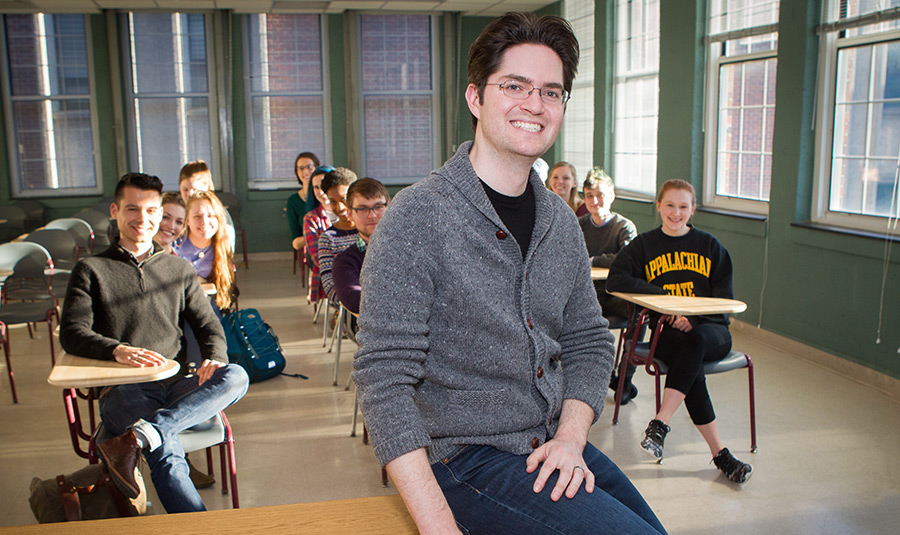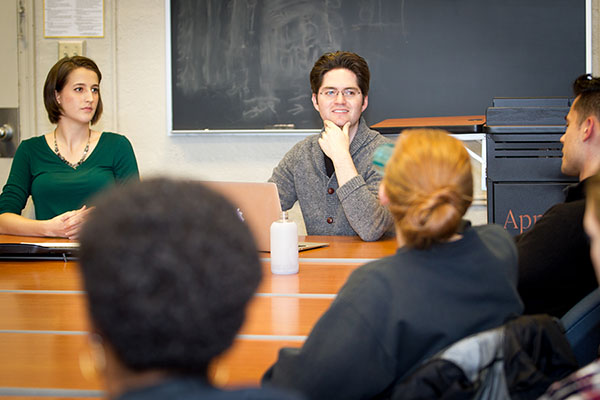BOONE, N.C.—Appalachian State University’s Dr. Andrew Monroe is a psychologist in the College of Arts and Sciences who studies people’s moral and social judgments.
In the most recent issue of Social Cognition: The Official Journal of the International Social Cognition Network, he was principal author of a study that found that although people often have optimistic beliefs about their futures, thinking about one’s future may cause people to behave pessimistically.
He and researchers from University of North Florida, University of Minnesota, and Florida State University conducted three experiments, which taken together suggest that even though people forecast a bright future, full of success for themselves, actively thinking about one’s future makes people more risk-averse, less trusting and harsher moral critics.
“This is an interesting finding, because it shows that by reflecting on what you want the future to be, it seems to make you worried about messing it up,” explained Monroe, who has taught at Appalachian since 2015.
“In some cases, this may be an adaptive tendency – after all, it makes sense to punish people who misbehave; that’s a powerful way to make sure they behave in the future. On the other hand, if thinking about the future causes us to miss out on potentially lucrative investments because they feel risky, then perhaps there is something important about allowing yourself to be more in the moment.”
Here are details about the experiments:
- In the first, 187 participants wrote about their future self in comparison to one’s present self. The majority (74 percent) wrote about positive experiences such as getting married or achieving professional success, but this did not translate to optimistic behavior as they favored low-risk, low pay-off investments rather than high-risk, high pay-off ones.
- In the second experiment, 69 participants restated sentences about their futures and then participated in trust games with another person. The findings showed that those who thought about the future trusted other people significantly less than participants who thought about the present.
- In the third experiment, 173 participants were asked to make judgments of praise and blame for various moral and immoral behaviors after reading statements about a person. The results showed increased blame for misdeeds – but no effect on praise for virtuous action.
Prior to joining Appalachian, Monroe was a post-doctoral fellow at Brown University and Florida State University. In his Morality and Social Cognition Lab in Appalachian’s Department of Psychology, he and his students explore the topics of free will and social norms/social pressures in shaping perceptions of mental states and morality.
In another set of experiments, recently submitted for publication, Monroe has tested how prioritizing certain moral values affects people’s perceptions of LGBTQ individuals. He and colleagues are finding that when people prioritize the moral value of sanctity over the moral value of care, it affects the dehumanization and discrimination toward LGBTQ individuals. “Individuals perceived as violating personally held moral values become part of the moral out-group, leading to dehumanization. Dehumanization, in turn, legitimatizes prejudice and discrimination towards moral out-group members,” the authors wrote.
This latest research may be able to shed light on why the American population can have such varying worldviews and how those views affect behavior. As psychologists, “we don’t make value judgements about values – we simply try to describe the phenomenon,” said Monroe.
Appalachian social psychologist Dr. Andrew Monroe studies relationship between moral values and prejudice
About the Dr. Wiley F. Smith Department of Psychology
Appalachian State University’s Dr. Wiley F. Smith Department of Psychology serves more than 1,400 undergraduate majors seeking the Bachelor of Arts or Bachelor of Science degree in psychology, as well as 90 graduate students across four graduate programs: experimental psychology (MA), industrial-organizational psychology and human resource management (MA), school psychology (MA/SSP) and clinical psychology (PsyD). Learn more at https://psych.appstate.edu.
About the College of Arts and Sciences
The College of Arts and Sciences (CAS) at Appalachian State University is home to 17 academic departments, two centers and one residential college. These units span the humanities and the social, mathematical and natural sciences. CAS aims to develop a distinctive identity built upon our university's strengths, traditions and locations. The college’s values lie not only in service to the university and local community, but through inspiring, training, educating and sustaining the development of its students as global citizens. More than 6,800 student majors are enrolled in the college. As the college is also largely responsible for implementing App State’s general education curriculum, it is heavily involved in the education of all students at the university, including those pursuing majors in other colleges. Learn more at https://cas.appstate.edu.
About Appalachian State University
As a premier public institution, Appalachian State University prepares students to lead purposeful lives. App State is one of 17 campuses in the University of North Carolina System, with a national reputation for innovative teaching and opening access to a high-quality, cost-effective education. The university enrolls more than 21,000 students, has a low student-to-faculty ratio and offers more than 150 undergraduate and 80 graduate majors at its Boone and Hickory campuses and through App State Online. Learn more at https://www.appstate.edu.
Contact Dr. Andrew Monroe
[email protected]
828-262-2272, ext. 431
Morality and Social Cognition Lab
What do you think?
Share your feedback on this story.













